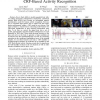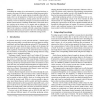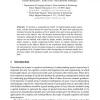3406 search results - page 17 / 682 » Computational models of classical conditioning |
ICPR
2010
IEEE
14 years 1 months ago
2010
IEEE
Abstract—Due to their ability to model sequential data without making unnecessary independence assumptions, conditional random fields (CRFs) have become an increasingly popular ...
ECAI
2004
Springer
14 years 2 months ago
2004
Springer
Controlling the sensing of an environment by an agent has been accepted as necessary for effective operation within most practical domains. Usually, however, agents operate in par...
ICPR
2008
IEEE
14 years 3 months ago
2008
IEEE
This paper presents a subject-independent EEG (Electroencephalogram) classification technique and its application to a P300-based word speller. Due to EEG variations across subje...
NLUCS
2008
13 years 10 months ago
2008
Abstract. To develop a computational model of understanding spatial expressions, various factors should be taken into account. We have been exploring the relations between the good...
ICMCS
2007
IEEE
14 years 2 months ago
2007
IEEE
Automatic segmentation and classification of recorded meetings provides a basis towards understanding the content of a meeting. It enables effective browsing and querying in a me...



